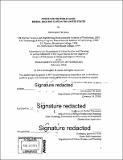Power for the public good : energy, race and class in the United States
Author(s)
Jones, Christopher Michael
DownloadFull printable version (14.46Mb)
Other Contributors
Massachusetts Institute of Technology. Department of Urban Studies and Planning.
Advisor
J. Phillip Thompson.
Terms of use
Metadata
Show full item recordAbstract
Racial discrimination has led to measurable disparities in many domains, including such areas as housing, education and banking. Numerous studies within these domains of social and economic life illustrate that discrimination is a significant barrier to the full and equitable deployment of products and services to those who need or desire them. However, very little research exists for understanding the existence and impact of discrimination specifically within the energy domain. This absence of examination prompted the central question of this dissertation: To what extent does discrimination directly impact access to electricity? Utilizing the Tennessee Valley Authority (TVA) as the site of investigation, I approached the central question by asking three sub-questions: 1) does electric utility ownership mode matter in the delivery of energy services; 2) did discriminatory practices exist in the policy formation and implementation of the TVA; and 3) how and to what extent does discrimination impact outcomes of energy distribution and access in the United States today? Because the study of discrimination can be a complex mix of social, political and economic dynamics, I applied quantitative and qualitative tools to this investigation. The application of multi-methods research is consistent with historical and policy studies that seek a comprehensive understanding of how discrimination originated, its effects, and its on-going impacts. Through this research, I argue that the TVA operated from a discriminatory framework and suggest that the racialized context within which the TVA existed led to discriminatory outcomes that run counter to the TVA's original vision and goals. One central finding of this research is that certain groups were systematically excluded from access to, and thus the benefits of, energy. Having identified outcome differences that may be attributed to discrimination, I also identified measurable impacts of this discrimination. This dissertation is significant in that it is the first systematic examination of the role that group differences (race and class) play in access to electricity. The findings speak to the need for additional research to better understand the impact of energy discrimination on various populations and to more closely examine the role of energy policies in fostering or preventing discriminatory outcomes.
Description
Thesis: Ph. D., Massachusetts Institute of Technology, Department of Urban Studies and Planning, 2016. Cataloged from PDF version of thesis. Includes bibliographical references (pages 145-151).
Date issued
2016Department
Massachusetts Institute of Technology. Department of Urban Studies and PlanningPublisher
Massachusetts Institute of Technology
Keywords
Urban Studies and Planning.